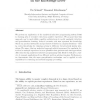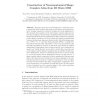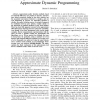884 search results - page 42 / 177 » Control structures in programs and computational complexity |
118
click to vote
COGSR
2011
14 years 9 months ago
2011
We present an application of the analytical inductive programming system Igor to learning sets of recursive rules from positive experience. We propose that this approach can be us...
147
Voted
MICCAI
2010
Springer
15 years 21 days ago
2010
Springer
Abstract. This paper proposes a novel technique for constructing a neuroanatomical shape complex atlas using an information geometry framework. A shape complex is a collection of s...
119
click to vote
MP
2008
15 years 2 months ago
2008
This paper proposes an efficient computational technique for the optimal control of linear discrete-time systems subject to bounded disturbances with mixed polytopic constraints o...
130
click to vote
ENTCS
2007
15 years 2 months ago
2007
Program slicing is a method for decomposing programs by analyzing their data and control flow. Slicingbased techniques have many applications in the field of software engineerin...
127
click to vote
CDC
2010
IEEE
14 years 9 months ago
2010
IEEE
Approximate policy iteration methods based on temporal differences are popular in practice, and have been tested extensively, dating to the early nineties, but the associated conve...



